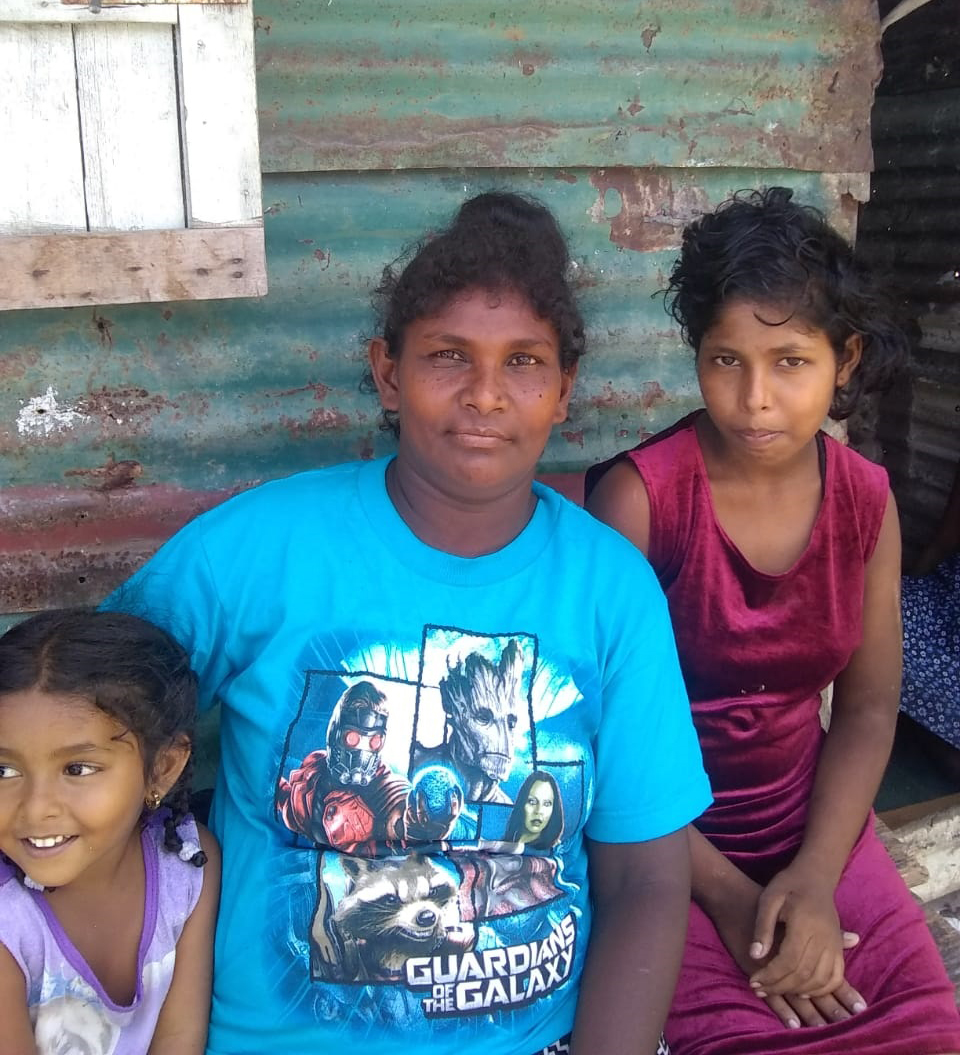When Sohan Suknandan and Radika Narine met over 20 years ago they were wide-eyed lovers who had their entire lives ahead of them, with dreams and ambition that they would work and together create the perfect life.
But the years have not been easy on the couple who met, according to Radika, when Sohan visited her community (Betsy Ground, East Canje Berbice) and “we just met up and get together.”
Seven children (between the ages of 18 and 3) later, they now live in a one-room shack on the Ogle seashore and even though Sohan works almost every day as a fisherman it is obvious that he earning is not enough to get the family out of abject poverty. They still have hope though.
“Right now we biggest thing is to get a piece of land and we would get a house. We went all to meet the President, but we didn’t get to see him. But we send a letter and we get a response but it say hundreds more people deh before we who want land. We gat to understand, you know, everybody can’t get the same time,” Sohan told the Sunday Stabroek in a recent interview.
As he spoke, their youngest daughter, who is three years old, and was sitting next to her mother just in front of the door was planting numerous kisses on a blown-up photograph of one of her brothers.
“You love brother, nuh?” her mother asked and the child bobbed her head rapidly, indicating she her affection for the older sibling.
The brother, seven-year-old Sunil, fondly known as Dave, is dead. He was killed in a tragic incident on September 13. He and his older sister, 17-year-old Venisha, were on a bicycle when they were struck down by a motorist.
Venisha was in the hospital for over a month and was only released on October 19. The scars from the accident are very evident on both of her arms, her legs and her head. Her emotional scars are also evident as when asked about her brother she would only shake her head with tears welling up in her eyes.
The accident made the family’s poor living conditions public and since then they have received donations, but they are still in dire need.
The woman who was driving the car, was placed on $75,000 station bail following the incident. She has offered the family $1 million as compensation, but Sohan said they cannot accept it. While they have not received any update from the police as to when the woman would be charged, they have since sought the services of a lawyer.
“We can’t accept that. You know how much I done spend alone when me daughter been in hospital? We talking to de lawyer,” Sohan said as he stood in their doorway.
Radika said she allows her husband to deal with the lawyer and while she knows that no amount of money can compensate for the death of their son, it may help improve their living conditions.
“Right now, it hard because is like three baby me get. Is this lil one hay [pointing to her youngest daughter], Venisha and me big daughter, you know, she handicap, so it hard pun me,” the woman said.
Their oldest daughter is 18 years old and she has never gone to school. She walks on her knees as below her knees, her feet are deformed.
“We never fatigue she and send she to school, you know,” the father said as he called her to meet me and she moved quickly through the house to greet the stranger standing at the door. Her mother said she can assist in the house, but she also has to take care of her because of the disability.
At present, they are constructing a house behind their shack and according to Sohan a government agency provided the material.
“I don’t really know which part of the government, but dem tell me is government and the man who building it we gaffo give lil time because he just get a baby and he have other work to do. But we guh build it and I guh break down this [indicating their current dwelling] and it guh get room and suh,” the father said. “And if we get a piece of land, we could always move the house, you know, put it on a trailer and move it,” he added.
Venezuela
Sohan recalled that initially they lived at Betsy Ground in his mother-in-law’s home and life was not that difficult because he worked with a construction firm which built houses and could adequately take care of his family.
But his mother-in-law, who lived in Venezuela, returned to Guyana and indicated she wanted to sell the house and land; she invited them to join her in the neighbouring country. So the family packed up and left for what they believed at the time was a better life.
“But things hard, hard over deh. Imagine one year we over deh and I can’t get no wuk, is just the lil money we went with, is dah we use and it done. I barely save lil bit to pay we passage to come back home. I say no sense we stay over deh and just punish,” Sohan said.
His mother-in-law operated a small sweets stand to support herself and his two brothers-in-law did not have steady jobs.
“And is nah nothing really good dem a live in, is a shack almost just like this,” Radika added.
The couple returned to Guyana and lived with a relative in Industry as there was no home for them to return to in Berbice.
“And Berbice get hard, you know, so we say leh we see if we could make it this side,” Sohan said.
The living arrangements with the relative did not work out, as apart from the steady conflict, which many times centred around the children the bottom flat where they lived was constantly flooded.
“Every time it rain is bare flood. You use to have use long boots to meet you bed, it was not easy. And then one day I just tell she don’t worry hold on I coming back. And I come hay because I done use to fish and dem boys tell me don’t worry you get material and within half a day we done put this up and the same day I move me family hay,” Sohan said.
The couple has called the location home for almost three years and while it is not as comfortable as they would like they both agreed that that they are “more at ease” in their own place.
To get to their home one has to trek a small grassy track from the Rupert Craig Highway. Their shack is the first of about six. They have a back door and a front door and apart from two beds there is not much more furnishing in the house.
“Me and she would throw a mattress down on the floor hay [pointing to the spot just by the front door] and dem girls would sleep on one bed and dem boys on another bed,” the father explained. When the Sunday Stabroek visited, they had guests and Sohan pointed to two hammocks which are also used for sleeping.
Radika is the only woman at the location and there are no other children there. The family has no access to potable water and depend on their neighbours and the rain to supply this.
“No man dem man know they can’t try nothing and me big son [he is fourteen] does be at home. Nobody never trouble we, or we never had no problem,” Sohan said when asked if he was not scared for his family’s safety when he leaves at night to do his fishing job.
Most times the fish is sold right at the seashore as persons would there to purchase it, and at other times it is sold at the road corner to passing motorists.
“Venisha is the sell woman though, she use to ride and sell,” Radika said.
“We does get we lil problem, you know, sometimes when he drink and so, we does get problem,” Radika said, misunderstanding a second question that was asked. She believed I was asking whether they have problems in their relationship, but the question was whether they have problems with those around them.
“No, no, nobody don’t bother we,” she said.
Asked if he hits his wife ,Sohan quickly responded in the negative.
“Beat she?” he asked almost incredulously. “If I slap she, you see, is dead she guh dead,” he added.
In front of the family’s yard there is a huge ochro tree, which, according to Radika, is the legacy of their now dead son.
“Is he plant the tree and you see how big it get? It had mo big leaves and when he come home from school, he and he and he lil sister would sit down under it and play together,” she said.
“You know how much ochro we get out of it, almost every two day we does pick ochro,” Sohan added.
She pointed to a small golden apple tree, which she said was also planted by her son and she is caring it and hopes it grows and bears fruit.
Out of their seven children only two attend school; Sunil is now dead, his little sister has not reached school age and the three older ones, according to their parents, have passed school age.
Venisha is not clear about what she wants to do when she grows older. A painfully shy teenager, she does not answer any question posed to her even though she is prompted by her parents.
The family’ may be poverty stricken, but like everyone else, they dream of a better life and the hope still burns deep within.






